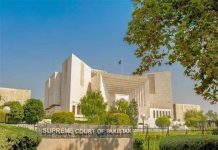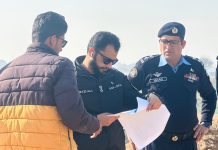By Minahil Makhdoom
RAWALPINDI: The affectees of the Dadhocha Dam in Rawalpindi on Monday held a public meeting and peaceful protest against their forced displacement by the Punjab government without rehabilitation.
The protest demonstration was attended by residents of Dadocha, Bharwala, Khanpur, Dhadhar Najaar, Mohra Wains villages close to Rawat industrial area. Because of the dam’s construction, over 400 households of over 5 villages (with nearly 4000 inhabitants) falling in the dam’s reservoir areas were in danger of losing their homes, agricultural lands and livelihoods. The meeting and march was also attended by AWP Punjab President Ammar Rashid, Hassan Turi, Ibrahim Bashir and Areej Hussain. Local farmers and villagers said that the Punjab government and district administration had commenced construction of the dam without any settlement with the indigenous inhabitants or a resettlement plan. This was being done through the imposition of the draconian Land Acquisition Act despite the fact that the matter was still sub-judice in the Lahore High Court.
Local resident Pervez Kiyani described how they were being offered a pitiful Rs. 5000 per marla (1 lac per kanal) for their agricultural land which was a fraction of their actual market value while the non-arable land in the area under DHA’s possession was being valued by the latter at nearly 80 lakh per kanal. He said if they were forced to leave their homes at such rates, they would be rendered homeless as it would be impossible to find other homes or land in Rawalpindi or adjoining areas at such rates. He urged Chief Minister Usman Buzdar and Prime Minister Imran Khan to take notice of the destruction of their livelihoods and to ensure they are justly compensated.
Speaking on the occasion, local resident and protest organizer Raja Fayaz-ul-Haq Janjua said that they were not against dam construction to benefit Rawalpindi’s residents but said that it should not be done at the cost of the forced displacement of local inhabitants, who should instead be justly compensated and physically and economically resettled within the area. He said that residents were not even sure if they could now bury their deceased loved ones in the local graveyard as that too would soon become submerged following the dam’s construction.
Residents further said that they were being dispossessed of lands that were even beyond the limits of those demarcated for the dam, ostensibly for commercial purposes. Some residents spoke of how the adjacent DHA Valley had also occupied their ancestral lands despite the fact that a court had already ruled that it belonged to the villagers. They said that this occupation by DHA was preventing them from resettling their households in the nearby location. They further said that it appeared that there was some collusion between local authorities and DHA (which was not objecting to dam construction without compensation) in order to get desperate residents to sell their lands at throwaway prices.
Speaking on the occasion, AWP Punjab President Ammar Rashid said that such dispossession was the result of the fact that the state in Pakistan was till operating through colonial-era laws and norms of development. He said that colonial laws like the Land Acquisition Act were designed by the British to allow them to easily dispossess and exploit indigenous inhabitants for the furtherance of their capitalist interests. He said that there were precedents of resettlement and rehabilitation in past dam projects, but that was only made possible by the struggles of the affectees who forced the authorities to recognize their rights.
He said that residents should prepare themselves for a peaceful struggle to make their voices heard in the corridors of power and receive the compensation due to them. After the public meeting, residents undertook a peaceful march to the site of the dam construction where FWO had set up its camp. They called on local site officers to abide by court orders and not begin construction of the dam without reaching a just consensus-based settlement with the local residents. The Assistant Commissioner Rawalpindi arrived on site to negotiate with the protestors and said they would be called for a meeting with the district administration to discuss these demands, but expressed his helplessness that the matter was ‘out of his hands’.
Following the conclusion of the march, residents vowed to continue their struggle for their rights and said they would stage a sit-in outside D Chowk and Parliament unless their just and lawful demands were heard.





